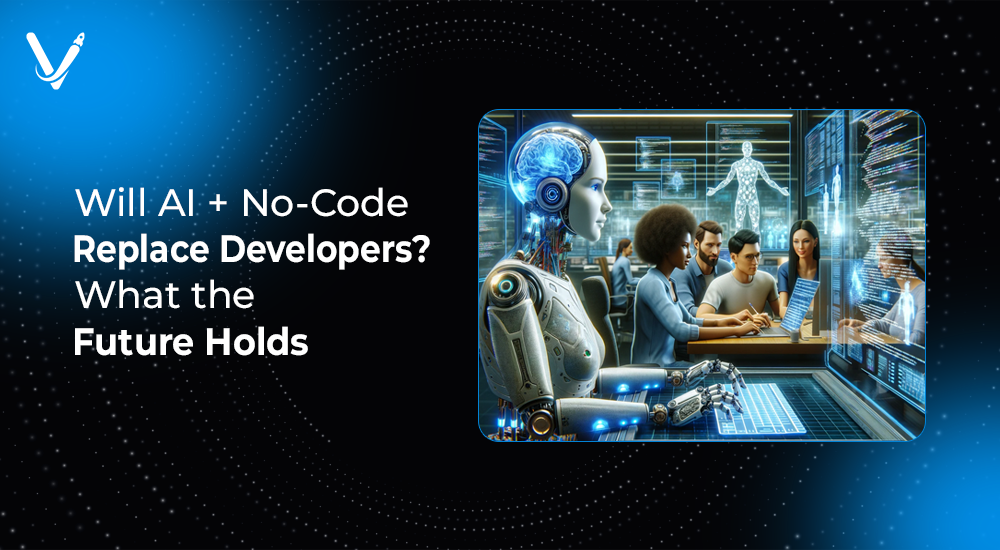Will AI + No-Code Replace Developers? What the Future Holds


- May 22, 2025
Artificial intelligence and no-code platforms have captured the imagination of developers, entrepreneurs, and business leaders alike. These tools promise to simplify the process of building applications, automate repetitive tasks, and enable non-technical users to create sophisticated digital products. But this rapid advancement also raises a critical question: Will AI and no-code tools eventually replace developers?
In this in-depth article, we’ll explore the intersection of artificial intelligence writing code, the rise of no-code platforms, how they’re already impacting software development, and what this means for the future of programming. We’ll dive into real-world case studies, explore the capabilities and limitations of AI, and ultimately answer the pressing question: Will coding be replaced by AI, or will it redefine the role of developers?
No-code platforms enable users to build web apps, mobile apps, automation workflows, and more using drag-and-drop interfaces and pre-built logic. They eliminate the need to write traditional code, making software creation accessible to non-engineers.
These tools have powered everything from MVPs to enterprise-grade solutions. Startups can now validate ideas faster, and internal teams can build custom dashboards or tools without waiting on engineering bandwidth.
However, the simplicity of no-code is also its limitation. It’s ideal for building CRUD apps and workflows, but scaling, security, integrations, and performance optimization still often require developers.
Tools like GitHub Copilot, ChatGPT Code Interpreter, Amazon CodeWhisperer, and newer models in 2025 are changing how developers write and review code. These tools offer AI code completion and can suggest functions, generate classes, and even write tests.
Modern AI-powered code completion tools go beyond IntelliSense-style suggestions. They:
Developers are no longer starting from a blank page. Instead, they prompt, refine, and optimize AI suggestions.
But is this a replacement or an augmentation?
Startups use AI and no-code tools to rapidly launch products. A solo founder in 2025 can now:
This would’ve taken weeks with a traditional dev team. Now it’s hours.
Case Study:
A health tech founder built a patient scheduling app in Bubble, enhanced it with AI-generated code to handle API logic, and launched in under 10 days—cutting 80% of costs.
In large companies, internal teams use no-code and AI-assisted tools for dashboards, forms, and automations. AI suggests code snippets, while no-code platforms handle frontends and workflow logic.
Case Study:
A retail chain used Airtable + Make + GPT integrations to automate inventory tracking, reducing manual entries by 90%.
Freelancers build landing pages in Webflow, automate reporting in Notion using AI scripts, and use voice commerce bots trained by AI to handle customer FAQs.
This makes small teams significantly more powerful—and profitable.
This is the million-dollar question. Let’s break it down into practical angles:
While artificial intelligence writing code has become incredibly powerful, it still lacks deep contextual understanding of business logic, legacy systems, and abstract requirements.
It works best when:
It struggles when:
So, is AI going to replace programmers? Not completely. But it will change the way they work.
Rather than writing every line, developers now act as:
This role transformation is already underway in top companies.
Stat:
According to a 2025 Stack Overflow Developer Survey, 67% of developers use AI tools weekly, and 49% say they’ve doubled productivity using AI assistants.
Yes—when used correctly.
However, poor prompts, blind acceptance of suggestions, or lack of testing can lead to security vulnerabilities or logical bugs.
Insight:
“AI lets junior devs code like mid-levels, and mid-levels code like seniors—but seniors are still needed to guide architecture.” — CTO, leading SaaS firm
No-code tools are powerful, but limited in:
Developers step in to:
Extend no-code platforms with custom scripts
Think of no-code and AI as your junior devs. Developers are still the tech leads.
In this world, the most valuable developers will be those who know how to leverage AI and no-code tools—not fear them.
The rise of artificial intelligence writing code and powerful no-code platforms has undoubtedly changed the software development landscape. But the idea that “will coding be replaced by AI” entirely is oversimplified.
Instead, we’re moving toward a hybrid future where AI coding assistants, no-code tools, and developers work together. Developers won’t be replaced—they’ll be augmented and elevated by these technologies.
At Vasundhara Infotech, we specialize in blending cutting-edge AI, no-code, and custom development to deliver scalable, intelligent solutions. Whether you're building an MVP, upgrading legacy systems, or integrating AI into your workflow, our experts can guide your journey.
Let’s build the future—together. Contact us today to discuss your next project.
Copyright © 2026 Vasundhara Infotech. All Rights Reserved.
